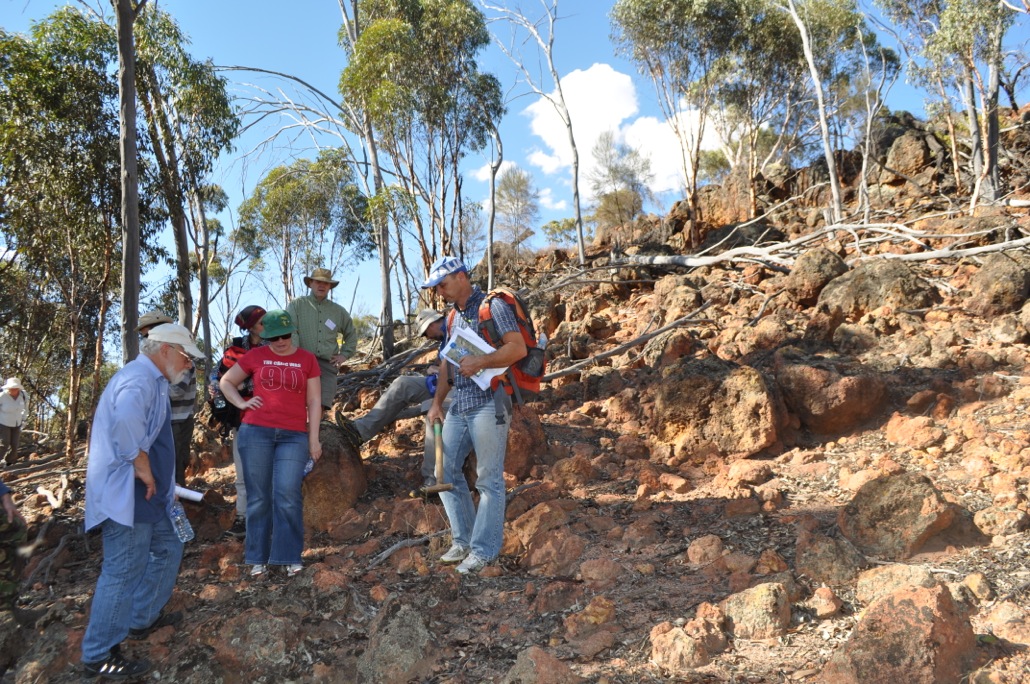
This research group intends to foster critical zone (CZ)—the zone that sustains most terrestrial life on earth—science in the southern hemisphere, which is currently addressed through large research programs only in the northern hemisphere (mainly US and EU). However, a wider perspective is necessary to fully address the functions and role of the CZ for global topics like food and water security or soil health. Thus, this project will establish a global network of sites called Critical Zone Observatories (CZOs), which:
- allow exchange of data;
- function as research platforms for international collaborations;
- function as training centres for postgraduates and early career researchers;
- address the specific CZ questions each in a unique environmental setting.
The Soil Science discipline of The University of Western Australia is in the process of building up Australia’s first CZO at the UWA Future Farm in Pingelly, WA focussing on ancient soils in a semi-arid landscape. Another CZO is being proposed for South Africa (Kruger National Park by the University of Cape Town). As a first step toward integrating southern hemisphere CZOs into the global network, an international workshop was held at UWA in April 2014 with international keynote speakers and scientists, NGOs, farmer groups and other land and water stakeholders addressing various topics of the CZ.
The workshop was subdivided into various modules. Each module started with a talk by one or two keynote speakers (Tim White, USA; Steven Banwart, UK; Enriquetta Barrera, USA via skype; Matthew Tonts, Australia; Oliver Chadwick, USA; Lesego Khomo, South Africa; Alex McBratney, Australia) followed by group sessions which addressed certain questions such as:
- Benefits of CZ science to help solve global problems like food, soil and water security
- Specific environmental conditions in the southern hemisphere (e.g. ancient soils, partly very young agriculture)
- Whether specific environmental conditions in the southern hemisphere are adequately represented in the newly developed research questions in CZ science (See Sustaining Earth’s Critical Zone Basic Science and Interdisciplinary Solutions for Global Challenges)
- Potential of CZ science for disciplines not yet included
- Benefits of a global network including the southern hemisphere
- Collaboration possibilities with NGOs and other research organisations (e.g. CSIRO, GRDC)
- Funding opportunities
- Barriers and benefits in international collaboration using CZOs resources
Outcomes were summarized by the group leaders and discussed in the auditorium.
A field trip took people out on the UWA Future Farm near Pingelly, WA. This gave the participants insight into of WA’s geology and geomorphology. Specific issues about the ancient weathering history of the landscape and the resulting low soil fertility, water availability and sustainability were addressed.
Outcomes
In 2019
Academic Publications
- O’Brien FJM et al. (2019) Soil Salinity and pH Drive Soil Bacterial Community Composition and Diversity Along a Lateritic Slope in the Avon River Critical Zone Observatory, Western Australia. Front. Microbiol.10:1486. doi: 10.3389/fmicb.2019.01486
- Lowe, M.A., Mathes, F., Loke, M.H., McGrath, G., Murphy, D.V., Leopold, M. (2019). Bacillus subtilis and surfactant amendments for the breakdown of soil water repellency in a sandy soil. Geoderma 344: 108-118.
2018
- CAMELO, D. D. L., GILKES, R. J., LEOPOLD, M., SILVA, A. C. & VIDAL-TORRADO, P., (2018). The application of quartz grain morphology measurements to studying iron-rich duricrusts. Catena. 170, p. 397-408 12 p.
- Camelo et al. (2018). Mineralogy, magnetic susceptibility and geochemistry of fe-rich oxisols developed from several parent materials. Scientia Agricola. 75, 5, p. 410-419 10
2017
- LOWE, M.-A., et al.. (2017): Evaluation of surfactant effectiveness on water repellent soils using electrical resistivity tomography. Agricultural water management, 181: 56-65.
Selected outcomes
- Matthias Leopold became a member of The Ministerial Advisory Committee of soils, WA (2018-19).
- Hosted the inaugural WUN Summer School on the topic of “Soil Science and Climate Change” at the University of Western Australia, Jan-Feb 2015.
- Hosted an international workshop on critical zone observatories in the southern hemisphere at the University of Western Australia, April 2014.
- Five research papers published.